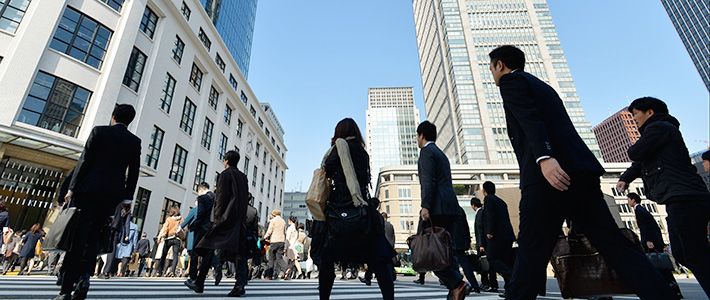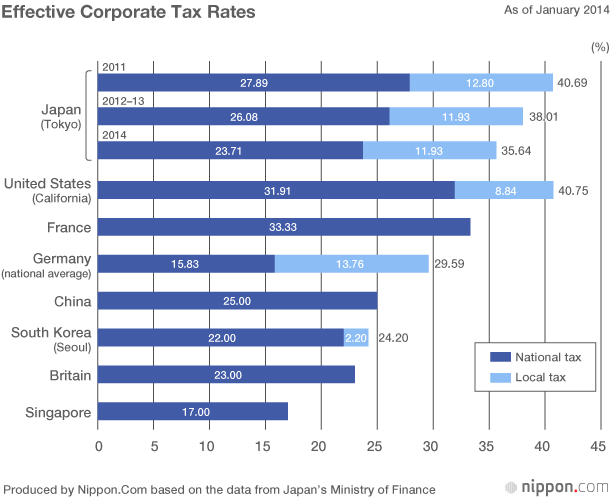
Reforming Corporate Tax by Expanding the Tax Base
Economy- English
- 日本語
- 简体字
- 繁體字
- Français
- Español
- العربية
- Русский
Second-Highest Corporate Tax Rate
Prime Minister Abe Shinzō’s latest package of economic reforms, approved by the cabinet on June 24, 2014, calls for the lowering of the effective corporate tax rate to under 30% to encourage greater investment by foreign firms and to enhance the competitiveness of Japanese industry.
The race to lower corporate tax rates originated in Eastern Europe in the 1990s following the end of the Cold War and eventually grew to engulf the rest of the world. The rate among the countries belonging to the Organization for Economic Cooperation and Development declined by an average of 20 percentage points in just 20 years.
Japan has not been left behind in following this trend, lowering its rate in 1998, 1999, and again in 2012, but it still stands several percentage points above other industrialized countries and around 10 points higher than other countries in Asia; today, it maintains the second highest rate in the world after the United States.
Japan’s comparatively higher tax rate and energy prices have pushed up the cost of doing business here. This, coupled with the long overvalued yen, has prompted many companies—primarily those competing in the global market—to move offshore, inviting deindustrialization and the loss of jobs in Japan’s outlying regions. The Abe administration’s moves to lower the rate represent an attempt to restore Japan’s competitiveness as a locus of business operations and to stem the tide of deindustrialization and job loss.
A Lower Rate Is Not Enough
In this sense, the lowering of the corporate tax rate is less of a proactive policy than a response to changes in the business climate. Whether it has an impact on boosting capital spending among domestic businesses and inducing foreign firms to move into Japan will hinge on the kind of growth strategies that are implemented going forward.
If Japan’s chief rivals are regarded as being other Asian countries, then the effective corporate tax rate needs to be lowered by around 10 points to 25%.

Generational Differences in Public Opinion
An opinion poll conducted on June 27–29 by the Nikkei and TV Tokyo (published in the June 30 morning edition of the paper) revealed that those favoring or opposing a lower corporate tax stood even at 40%. Younger respondents were more inclined to be in favor, with 56% in their twenties and thirties saying they were for a lower rate, as opposed to 26% who were against. The corresponding shares for those in their sixties, on the other hand, were 37% and 45%.
One likely reason for the strong public resistance to a lower rate is that the consumption tax has just been hiked to meet the revenue needs of supporting an aging population, prompting consumers to wonder why they must pay more while businesses pay less—especially since the economic benefits of a lower corporate rate have not been convincingly verified.
Such public concerns must be assuaged by clearly spelling out policies designed to minimize any revenue shortfalls through an expansion of the tax base, primarily for the corporate tax, and to reform those aspects of the corporate tax systems that have come under criticism.
Indeed, the Basic Policies for Economic and Fiscal Management and Reform—the growth strategy Abe announced on June 24—explicitly states that while the effective corporate tax rate will be lowered incrementally over several years to below 30%, it will be done so in ways that will not result in revenue shortfalls—such as by expanding the tax base to secure permanent revenue sources—nor impede the closely monitored progress toward the goal of achieving primary balance by fiscal 2020.
Reevaluation of “Special Taxation Measures”
Specific steps being considered to expand the tax base include a reexamination of write-offs for depreciation and a reevaluation of various “special taxation measures” introduced to address specific policy needs. Many have pointed to the need to reform these measures, which are being targeted for a zero-based review by the government Tax Commission. Specifically, the commission calls for the (1) abolition, in principle, of limited-time policy measures when their term expires; (2) establishment of expiration dates for measures whose terms are not specified, and a reprioritization of their policy focus; and (3) sweeping reevaluation, including abolition, of measures that apply to or are implemented for only a narrow range of businesses.
Many of these incentive measures were introduced on a limited-time basis to pull Japan out of deflation. Now that deflation has largely been overcome, they should quite naturally be eradicated. In the past, though, such measures often persisted even after their policy objectives had been met. The Tax Commission’s statement thus seeks to end this bad habit and restore the public’s confidence in the nation’s tax policy.
A law to enhance transparency, enacted while the Democratic Party of Japan was in power, is already leading to the abolition, under certain conditions, of measures that no longer widely apply. This is a step in the right direction, and active use should be made of this law.
In many ways, these measures are a carryover of the postwar “iron triangle”: the collusion among bureaucrats, politicians, and big business. And this is exactly the place where Abe should turn his “drill bit” to punch through the vested interests impeding structural reforms.
The Need for Structural Reform
Finally, I would add that it is not enough to simply lower the corporate tax rate. What the Japanese economy needs are structural reforms to the system of corporate taxation to win back public confidence in the government’s tax policy as a whole.
This will mean curtailing some of the tax breaks now available to various public interest corporations, including social welfare organizations, which were largely untouched in the reforms undertaken between 2000 and 2008. Given the changes in the environment surrounding public interest corporations, there should be a review of the preferential tax treatment accorded to these organizations—even when they are not-for-profit—with a view to placing them on an equal footing with private groups offering competing services.
Promoting Growth and Fiscal Consolidation
Many economists are likely to recommend that revenue shortfalls resulting from a cut in the corporate tax rate be offset with the additional revenues generated through the Abenomics policy of economic growth. Would this be feasible?
As I noted above, many former Soviet-bloc countries lowered their corporate tax rates following the Cold War to promote investments by West European companies. Germany, France, and other industrial countries responded by slashing their rates, triggering a rate-cutting war.
Corporate tax revenues as a share of gross domestic product in many member states of the European Union rose despite the lower rates—a phenomenon referred to as the corporate tax paradox. This has led some to argue that even if Japan’s rates are lowered, revenues may not drop at all.
Official EU statements ascribe this paradox to the fact that (1) the lowering of the (statutory) rate was accompanied by an expansion of the tax base and (2) the lower rates and growth strategies of member states encouraged corporate entrepreneurship, thereby boosting economic activity. An additional factor may have been the decision by many self-employed workers to incorporate their businesses in the wake of lower corporate taxes.
This experience offers a valuable lesson that if a cut in the corporate tax rate is accompanied by an expansion of the tax base and implementation of a growth strategy, policies to boost economic growth can go hand-in-hand with fiscal consolidation efforts. In other words, inducing a corporate tax paradox requires a bold growth strategy of deregulation and other measures that can boost business performance, leading to higher household incomes, dividends, and capital gains and resulting in gains in fiscal revenue and national income.
Higher revenues are a result of appropriate economic policy, not a precondition. And as long as the goal of a lower corporate tax rate is to both generate economic growth and restore fiscal health, any windfall resulting from the corporate tax paradox should rightly be utilized to achieve fiscal consolidation.
(Title photo: Corporate employees in Ōtemachi, Tokyo, where the head offices of many of Japan’s biggest companies are located. © Jiji Press.)
Abe Shinzō Growth strategy Corporate tax deindustrialization fiscal consolidation tax system corporate tax paradox